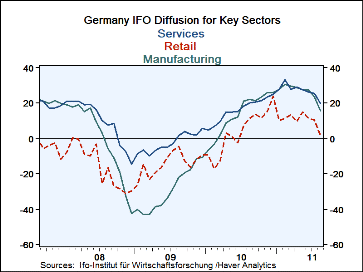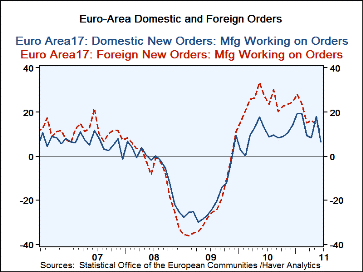 Global| Aug 24 2011
Global| Aug 24 2011German IFO Shows Weakness...EMU Order Show Clear Decay As Well
Summary
There is no mistaking the sector trends in the chart for the German IFO index. Sectors are losing momentum and that loss of momentum has accelerated. While there is some DENIAL economics in train I think we are best off swallowing the [...]
There is no mistaking the sector trends in the chart for the German IFO index. Sectors are losing momentum and that loss of momentum has accelerated.
While there is some DENIAL economics in train I think we are best off swallowing the bitter pill of disappointment instead of putting it off. These surveys are showing a very clear and consistent picture of economic erosion. I did not include a chart of it here, but the behavior of the German IFO index and the EU Commission indicators for Germany tell quite the same story. This is not some fluke report. Some would try to point to 'indicators' such this report that are forward-looking to dismiss them (This report is for August instead of for June or July as is the case for activity indicators). These wanna-be optimists argue that the indicators are weaker than the measures of actual actively such industrial production which rose in the US or durable goods orders and shipments etc. which were stronger than expected in the US also in July. Why does July trump August?
Fresher is better. And outlook surveys are better, fresh assessments of what people think than actual reports of current activity which may be reflecting orders placed earlier and now winding down. In the case of autos, output increases after a disruption are trying to build stocks for sales that may or may not even develop. So I do not share the zeal of those want to squeeze consolation out of the better 'real activity' data.
Germany is seeing its sector indicators fall off and fall off fast. We do not yet have IP figures for July in Germany or for the Zone but the last reading for June was no counterpoint to weakness. The ongoing debt 'crisis' in the Euro-Area is taking a terrible toll on sentiment and it would be foolish to think that such a mindset does not get into real decision-making channels as well.
While the German IFO index for business climate stands at +10 in August it is down from 17.9 in July. Its +10 reading corresponds to a standing in that index's historic queue of values in the 85th percentile. That is still pretty high. Indeed, the table demonstrates that most sector readings of ranked standings are high with services the weakest one in August in the 74th percentile. But the service sector in Europe is an important jobs sector and that sector is lagging.
The current index in contrast at +24.2 stands in the 94th percentile of its queue, showing how still strong German conditions are. But expectations have slipped to -3.4 in August from +6.2 In July and their standing has dropped to the 41st percentile of its range. It's the outlook that is less rosy and that is the point.
If we turn to another new report on the day of European industrial orders, a report that is current through July, we find yet another example of declining growth in orders. Both domestic-sourced and foreign-sourced orders are slowing in the Zone. This month the domestic slowdown is somewhat faster than the foreign orders slowing.
But what is clear is that slowing trends are everywhere. Should we extrapolate them below the zero line and project shrinkage and recession?
Most economists have not gone there yet for Europe or for the US. But it is clear that they are on a thin line. US economists have cut US growth estimates for the second half of the year from 3% to 2% to 1% and under 1% with some having growth rates of 0.5% (Saar) in the coming quarters. There is a great reluctance to put a negative sign in front of a GDP growth rate.
No wonder… With US unemployment at 9%-plus and with Europe's rates lower but still elevated and with Spain's rate still in the stratosphere there is reluctance to pour gasoline on a bonfire.
But the Fed's long held view of a second half bounce has long been a forecast of convenience more than of expected value. There were one-time events that hammered US growth in the first half but we have come to see how much weaker US growth was in the first half than what we thought at the time. Market events, meanwhile, have worsened. Europe's debt crisis is like a pit bull digging its teeth deeper and deeper. And the more we/I look at the details of Europe's situation, the worse things look.
The US whose growth is important for everyone still has Republicans and Democrats at logger heads and the best forward-looking data are still weak. Markets have tried to ignore the recent weakness in the Philly Fed MFG Survey and to set aside the weak Richmond reading but regional Fed reports continue to find a sharp tail-off in the US. You can't blame it all on the European debt crisis and Japan's disasters.
We have little reason to see a second half pickup with all the loss in momentum and with the big negatives in the outlook still unresolved and still being fought over… and with fiscal stimulus fading. My own personal view is that we have a really rotted out international financial system that is undermining growth in the US economy and creating persistent asset bubbles. This view is not widely shared but it can explain a lot of what is going wrong in the US. And as the key economy in the world everyone should be worried about that. Just because Europe has its own special problems is no reason to stop worrying about US growth prospects or to become complacent.
With the KC Fed's Jackson Hole meeting in train all eyes are on the State of Wyoming, now a hotbed of international focus-moose and all. Bernanke and Trichet will both be there. Hopes are high for something. But realistically each of these men has already done too much. History is much more likely to be critical of them for these acts in these final days than to slap them on their backs. Dissent in the Fed is undermining Bernanke. Dissent across European member countries has undercut Trichet as his ECB term comes to a close.
In the end economists look at monetary and fiscal policy coordination. But when fiscal policy has been so inadequate for so long it is hard for monetary policy to make up for it. Any attempts to do so just seem to undercut monetary policy effectiveness itself. Will that be the lesson we take away from Jackson Hole? Or is that a lesson we have not yet learned?
11
11
Robert Brusca
AuthorMore in Author Profile »Robert A. Brusca is Chief Economist of Fact and Opinion Economics, a consulting firm he founded in Manhattan. He has been an economist on Wall Street for over 25 years. He has visited central banking and large institutional clients in over 30 countries in his career as an economist. Mr. Brusca was a Divisional Research Chief at the Federal Reserve Bank of NY (Chief of the International Financial markets Division), a Fed Watcher at Irving Trust and Chief Economist at Nikko Securities International. He is widely quoted and appears in various media. Mr. Brusca holds an MA and Ph.D. in economics from Michigan State University and a BA in Economics from the University of Michigan. His research pursues his strong interests in non aligned policy economics as well as international economics. FAO Economics’ research targets investors to assist them in making better investment decisions in stocks, bonds and in a variety of international assets. The company does not manage money and has no conflicts in giving economic advice.








